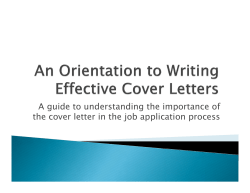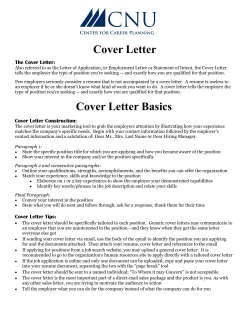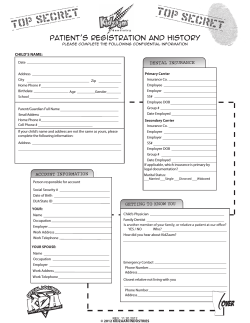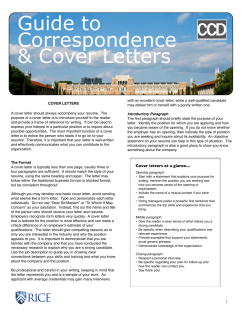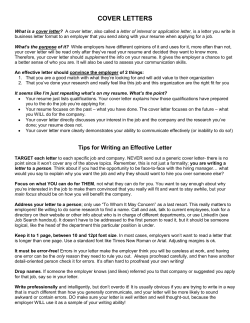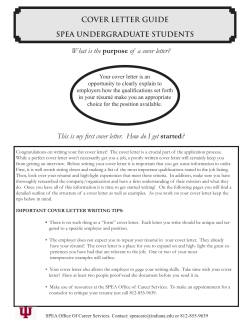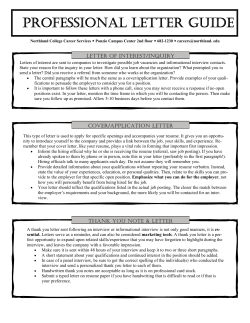
C L 101 OVER
COVER LETTERS 101
Office of Career Services
Suite 103 – Trinity Library
www.trinitydc.edu
202-884-9636
The Dynamic Cover Letters Formula for Job-Search Success
Note: You have a maximum of 20 seconds to wow the reader of your letter, so you
better maximize its impact by making it dynamic!
There is a formula that can be followed as a guide to writing your cover letters.
However, it is critical that each cover letter be unique and specific to you and to the
employer -- not one that any applicant could have written to any employer.
Keep your cover letter brief. Never, Never more than one page, and it’s best to keep it
well under a full page. Each paragraph should have no more than one to three
sentences.
If you are writing cover letter that you plan to email, consider shortening the cover letter
to just three short paragraphs so that it runs no longer than about one screen.
Fundamentals of a Dynamic Cover Letter
First Paragraph
Do not waste this opening paragraph of your cover letter. It is essential that your first
paragraph sparks the employer’s interest, provides information about the benefits the
employer will receive from you, and helps you stand out from all the other job-seekers
who want the job.
Focus on your Unique Selling Proposition-- the one thing that makes you different from
all the other job-seekers -- and identifying two or three benefits you can offer the
employer.
Weak opening paragraph: I am writing today to apply for the account manager position
you have posted on your company Website.
Better opening paragraph: I have increased the size and sales levels of my client base in
every position I have held, which in turn has increased the revenues and profits of my
employers. I want to bring this same success to the account position you have posted on
your Website.
Second Paragraph
Provide more detail about your professional and/or academic qualifications. Provide
more information about how you can provide the benefits you mention in the first
paragraph. Be sure to stress accomplishments and achievements rather than job duties
and responsibilities. Expand on specific items from your resume that are relevant to the
job you are seeking. Use solid action verbs to describe your accomplishments and
achievements.
2
If you do not have a lot of solid experience in the field you are trying to enter, remember
to focus on key skills that can easily transfer from your previous work experience to the
job at hand.
And if responding to a job posting or ad, be sure to tailor this paragraph to the needs
described in the ad.
Third Paragraph
Relate yourself to the company, giving details why you should be considered for the
position. Continue expanding on your qualifications while showing knowledge of the
company.
You need to do your homework -- show that you know something about the
organization.
Fourth Paragraph
The final paragraph of your cover letter must be proactive -- and request action. You
must ask for the job interview (or a meeting) in this paragraph. You must express your
confidence that you are a perfect fit for the job. You must also put the employer on
notice that you plan to follow-up within a specified time.
Weak closing paragraph: I hope you will review my resume, and if you agree with what
I have stated here, consider me for the position. I look forward to hearing from you
soon.
Better closing paragraph: I am eager to help advance the success of your company, and I
am convinced that we should arrange a time to meet. I will call your office in the next
week to schedule an appointment.
Final Thoughts
One last piece of advice: Follow-up is key, so plan on making some phone calls or
sending some emails.
20 Cover Letter Blunders to Avoid
There are certain errors that promise to diminish your hard work of writing a cover
letter. From typographical mishaps to erroneous employer information, all mistakes
have a negative impact on the application process. Serious errors will land your
application in the wastebasket. Be forewarned: Carefully read your cover letter at least
twice.
The following list outlines some of the most common cover letter mistakes and, more
3
importantly, suggests ways to correct them. These examples have been adapted from
real-life cover letters gathered during the course of our research. Although some of these
blunders may seem obvious, they occur far more often than you might think. Needless
to say, none of the inquiries that included these mistakes met with positive results.
1. Unrelated career goals: Tailor your cover letter to the specific position applied for. A
hiring manager is only interested in what you can do for the company, not what you
hope to accomplish for yourself. Your letter should convey a genuine interest in the
position and a long-term pledge to fulfilling its duties. Consider the difference between
these two real-life examples:
Example A (wrong way): "While my true goal is to become a Professional Dancer, I am
exploring the option of taking on proofreading work while continuing to train for the
Boston Ballet's next audition."
Example B (right way): "I am very interested in this proofreading position, and I am
confident of my ability to make a long-term contribution to your capable staff."
2. Comparisons and clichés: Avoid obvious comparisons and overused clichés; such
expressions distract from your letter's purpose: to highlight your most impressive skills
and accomplishments.
Here are a few real-life blunders we encountered: "My word processor runs like the
wind," "I am a people person," "Teamwork is my middle name," "Your company is
known as the crème de la crème of accounting firms," "I am as smart as a whip," "Among
the responses you receive for this position, I hope my qualifications make me leader of
the pack." So, remember to adopt a formal, professional writing style.
3. Wasted space: Since cover letters are generally four paragraphs long, every word of
every sentence should be directly related to your purpose for writing. In other words, if
you are applying for a position as a chemist, include only those skills and experience
most applicable to that field. Any other information weakens your application. Some
real-life blunders we've seen include:
Example: "As my enclosed resume reveals, I possess the technical experience and
educational background to succeed as your newest Civil Engineer. In addition, I am a
certified Gymnastics Instructor who has won several local competitions."
Example: "I am writing in response to your advertisement for an Accounting Clerk.
Currently, I am finishing an associate degree at Fisher Junior College. My courses have
included Medieval Architecture, Film Theory, American History before 1900, and
nutrition."
4
4. Form letters. Mass mailing, in which you send a general form letter to a large number
of employers, are not recommended. This approach does not allow you to personalize
each application. Every cover letter that you write should be tailored to the position you
are seeking and demonstrate both your commitment to a specific industry and
familiarity with each particular employer. Mass mailings may indicate to a hiring
manager that you are not truly interested in joining his or her organization.
There are certain formats and phrases that signal to an employer that you are using a
form letter. In one real-life mass mailing mishap, the candidate created a form letter with
blank spaces where he penned in the employer's name and position applied for. Another
applicant who was indecisive about her field of interest created a list of possible
positions in her letter. She then circled the most appropriate job description depending
on the targeted company.
5. Inappropriate stationery: White and ivory are the only acceptable paper colors for a
cover letter. We've seen letters in every shade from hot pink to electric blue and, to be
honest, the color was the only thing we noticed. Also, we recommend standard office
stationery; steer clear of transparent typing paper or personal stationery.
In any case, the stationery you choose should not distract from the contents of your
cover letter. A cat enthusiast who applied to our company "enhanced" her letter with
several images of her favorite felines. A musician applying for an office position sent a
letter decorated with a border of musical notes and instruments. Remember, don't rely
on graphics to "improve" your cover letter, let your qualifications speak for themselves.
6. "Amusing" anecdotes: In general, if you desire serious consideration, your cover letter
should adopt a serious, professional tone. Imagine yourself in an interview setting. Since
you do not know your interviewer, you would not joke with him or her until you have
determined what demeanor is appropriate. Likewise, when writing to a potential
employer you have not met, you should remain polite and professional. Avoid blunders
like the one this job hunter made:
Example: "I feel I am especially qualified to join your staff, as my name, Chris Smith,
almost rhymes with your company, Christmas."
7. Erroneous company information. If you were the employer, would you want to hire a
candidate who confuses your company's products and services or misquotes recent
goings-on? To avoid such errors, be sure to verify the accuracy of any company
information that you mention in your cover letter. On the other hand, if you haven’t
researched the company, don't bluff. Statements like "I know something about your
company" or "I am familiar with your products" signal to an employer that you haven't
done your homework.
5
When citing information about a company, be specific. The following is an example of
an effective way to use company information in your cover letter. "I have been following
Any Corporation's growth for many months and I was excited to learn of your recent
acquisition of C&M, Inc. Congratulations on successfully entering the international
market!"
8. Desperation: In your cover letter, you should sound determined, not desperate. While
an employer appreciates enthusiasm, he or she may be turned off by a desperate plea for
employment. However, a fine line often separates the two, so the best advice would be
to follow your instincts. Here are a few blunders to avoid: "I am desperately eager to
start, as I have been out of work for six months," "Please call today! I'll be waiting by the
phone," "I really, really need this job to pay off medical bills." In one letter we came
across, the candidate even dramatically enlarged the type of this closing statement, "I
AM VERY BADLY IN NEED OF MONEY!"
9. Personal photos: During the course of our research, we found actual photographs of
candidates enclosed in job applications. We opened one letter to find an 8-by-10-inch
glossy of a doctor surrounded by her patients. Another candidate used his computer to
electronically scan his image onto the cover letter stationery. A third blew up a picture of
his face to cover the entire page, then handwrote his letter over it!
Unless you are seeking employment in modeling, acting, or other performance
industries, it is not appropriate to send a photograph. An employer will see what you
look like should you reach the interview stage. Until then, even the cutest baby face
won't help you get a foot in the door!
10. Confessed shortcomings: Some job-hunters mistakenly call attention to their
weaknesses in their cover letters, hoping to ward off an employer's objections. This is a
mistake because the letter emphasizes your flaws rather than your strengths. For
example, avoid statements such as these: "Although I have not related experience, I
remain very interested in the Management Consultant position" and "I may not be well
qualified for this position but it has always been my dream to work in the publishing
field." Instead, emphasize your strengths, including valuable skills, related experience,
and company knowledge.
11. Misrepresentation: In any stage of the job-search process, never, ever, misrepresent
yourself. In many companies, erroneous information contained in a cover letter or
resume will be grounds for dismissal as soon as the inaccuracy is discovered. Protect
yourself by sticking to the facts. You are selling yours skills and accomplishments in
your cover letter. If you achieve something, say so, and put it in the best possible light.
Don't hold back or be modest--no one else will. At the same time, however, don’t
exaggerate to the point of misrepresentation.
6
Example: "In June, I graduated with honors from American University. In the course of
my studies, I played two varsity sports while concurrently holding five jobs."
Example: "Since beginning my career four years ago, I have won hundreds of
competitions and awards, and am considered by many to be the best Hair Stylist on the
East Coast."
12. Demanding statements: Keep in mind that your cover letter should demonstrate
what you could do for an employer, not what he or she can do for you. For example,
instead of stating, "I am looking for a unique opportunity in which I will be adequately
challenged and compensated," say "I am confident that I could make a significant
contribution to your organization, specifically by expanding your customer base in the
Northwest region and instituting a discount offer for new accounts."
Also, since you are requesting an employer's consideration, your letter shouldn't include
personal preferences or demands. Statements such as "It would be an overwhelmingly
smart idea for you to hire me" or "Let's meet next Wednesday at 4:00 p.m., when I will
be available to discuss my candidacy further" often put the potential employer on the
defensive. Job candidates' demands are rarely met with an enthusiastic response.
13. Missing resume: Have you ever forgotten to enclose all the materials you refer to in
your cover letter? On numerous occasions, we've received letters with no resumes.
Writing samples have been promised but not delivered. Not only is this a
disappointment, but a fatal oversight. No employer is going to take the time to remind
you of your mistake; he or she has already moved on to the next application.
14. Personal information: do not include your age, weight, height, marital status, race,
religion, or any other personal information unless you feel that it directly pertains to the
position that you’re seeking. For instance, age might be relevant if you are seeking a job
at seniors' organization and height and weight may be important if you are applying to
an athletic team.
Similarly, you should list your personal interests and hobbies only if they are directly
relevant to the type of job you are seeking. If you are applying to a company that greatly
values teamwork, for instance, citing that you organized a community fundraiser or
played on a basketball team will probably be advantageous. When in doubt, however,
leave it out.
15. Choice of pronouns: Your cover letter necessarily requires a thorough discussion of
your qualifications. Although some applicants might choose the third person ("he or
she") as a creative approach to presenting their qualifications, potential employers
sometimes find this voice disconcerting. In general, using the first person ("I") voice is
preferable.
7
Example A (wrong way): "Chris Smith is a highly qualified Public Relations Executive
with over seven years of relevant experience in the field. She possesses strong verbal and
written communication skills and her client base is extensive."
Example B (right way): "I am a highly qualified Public Relations Executive with over
seven years of relevant experience in the field. I possess strong verbal and written
communication skills and my client base is extensive."
16. Tone trouble: Tone problems are subtle, and may be hard to detect. When you are
reading your cover letter back to yourself, patrol for tone problems by asking yourself
after each sentence: Does that statement enhance my candidacy? Could a hiring
manager interpret that last statement in an unfavorable way? Have a second reader
review your letter. If the letter's wording is questionable, by all means rewrite it. Always
phrase your statements in a positive way!
17. Gimmicks: Gimmicks such as sending a home video or a singing telegram to replace
the conventional cover letter may seem attractive. No matter how creative these ideas
may sound, the majority of employers will be more impressed with a simple, wellcrafted letter. In the worst-case scenario, gimmicks can even work against you,
eliminating you from consideration. Examples we've seen include sending a poster-size
cover letter by courier service or baseball hat with a note attached, "I'm throwing my hat
into the ring!" Avoid such big risks; most hiring decisions are based on qualifications not
gimmicks.
18. Typographical errors: It is very easy to make mistakes in your letters, particularly
when you are writing many in succession. But it is also very easy for a hiring manager to
reject out of hand any cover letter that contains errors, even those that seem minor at
first glance. Don't make the mistake that one job-hunting editor recently made, citing his
attention to detail while misspelling his own name!
Here are a few common technical mistakes to watch out for when proofreading your
letter:
* Misspelling the hiring contact's name or title in the address, in the greeting, or on the
envelope.
* Forgetting to change the name of the organization you're applying to each time it
appears in your application, especially in the body of the letter. For example, if you are
applying to Boots and Bags, in your closing don't express enthusiasm for a position at
Shoe City.
* Indicating application for one position and mentioning a different position in the
8
body of the letter. For instance, one candidate applying for a telemarketing position
included the following statement, "I possess fifteen years' experience related to the
Marketing Analyst availability."
19. Messy corrections: Your cover letter should contain all pertinent information. If, for
any reason, you forget to communicate something to your addressee, retype the letter.
Including a supplementary note, either typed or handwritten, will be viewed as
unprofessional or, worse, lazy. For example, one candidate attached a "post-it" note to
his cover letter, stating his willingness to travel and/or relocate. This, and all other
information, must be included in your final draft.
Also, try to avoid using correction fluid or penning in any corrections. It's always a
better idea to take the time to retype the letter perfectly.
20. Omitted signature: However obvious this might sound, don't forget to sign your
name at the close of your cover letter. Far too many letters that we've seen had a typed
name, but no signature. An employer might interpret this oversight as carelessness.
Also, your signature allows you the chance to personalize your letter. Don't blow it by
using a script font or a draw program on your word processor. Although there is a
rainbow of colors to choose form, always sign your name neatly in blue or black ink.
References
Hansen, K. & Hansen, R. The dynamic cover letters formula for job-search success. (n.d.)
Retrieved August 15, 2005 from www.quintcareers.com/cover_letters.html.
Adams Media Corp. 20 cover letter blunders to avoid. (n.d.) Retrieved July 29, 2005 from
http://www.smartbiz/article/articleview/55/1/8/.
9
© Copyright 2025

